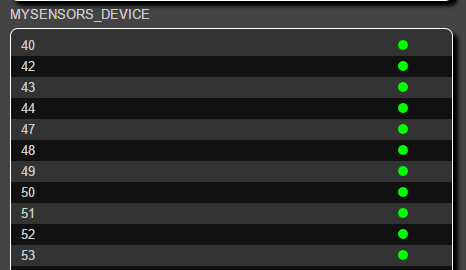My Slim 2AA Battery Node
-
So, it seems i made some progress.
After changing to the @GertSanders bootloader ( https://www.openhardware.io/view/33/Various-bootloader-files-based-on-Optiboot-62) all the PIR nodes seem to be stable.
I´m using these settings
Wish me luck :)
@Komaandy Yes, using 8MHz instead of 1MHz is perhaps a good idea. Stable enough at room temperature, well proven and will e.g. solve a "Serial.print()" interrupt loop issue. Just remember that you'll lose ~25uA if you'll leave BOD enabled.
-
@Komaandy Yes, using 8MHz instead of 1MHz is perhaps a good idea. Stable enough at room temperature, well proven and will e.g. solve a "Serial.print()" interrupt loop issue. Just remember that you'll lose ~25uA if you'll leave BOD enabled.
@m26872 said in My Slim 2AA Battery Node:
Just remember that you'll lose ~25uA if you'll leave BOD enabled.
No, on ATMega328 MySensors disables BOD before going to sleep.
So extra consumption from BOD will only exist when node is active and in that case it's negligible. -
@m26872 said in My Slim 2AA Battery Node:
Just remember that you'll lose ~25uA if you'll leave BOD enabled.
No, on ATMega328 MySensors disables BOD before going to sleep.
So extra consumption from BOD will only exist when node is active and in that case it's negligible. -
@m26872
thanks again for this great idea and that you developed these fine boards !
And by the way...
As you are using fhem as well...
How do you manage to reset the tripped "1" in Fhem ?
I just added a delay and a gw.send"0" to your sketch :), but using fhem would be more sophisticated actually ...
Thanks -
@m26872
thanks again for this great idea and that you developed these fine boards !
And by the way...
As you are using fhem as well...
How do you manage to reset the tripped "1" in Fhem ?
I just added a delay and a gw.send"0" to your sketch :), but using fhem would be more sophisticated actually ...
Thanks@Komaandy said in My Slim 2AA Battery Node:
How do you manage to reset the tripped "1" in Fhem ?
I don't. I just use the last trip time as it's state and then notify (e.g. light or push message) on trip. I think it should be very simple to make a notify with a timer "at" to reset it after a while, if you wish.
-
All of the ducting near me is a bit too slim to fit sensors based on this, so I decided to design and print a case instead.
Does the trick nicely, and I also chose to use proper AA battery clips to retain a good connection, as the cable-tie battery assembly wasn't holding well for me!
On the Thingiverse page I have a link to the original OnShape doc.
https://www.thingiverse.com/thing:2418194
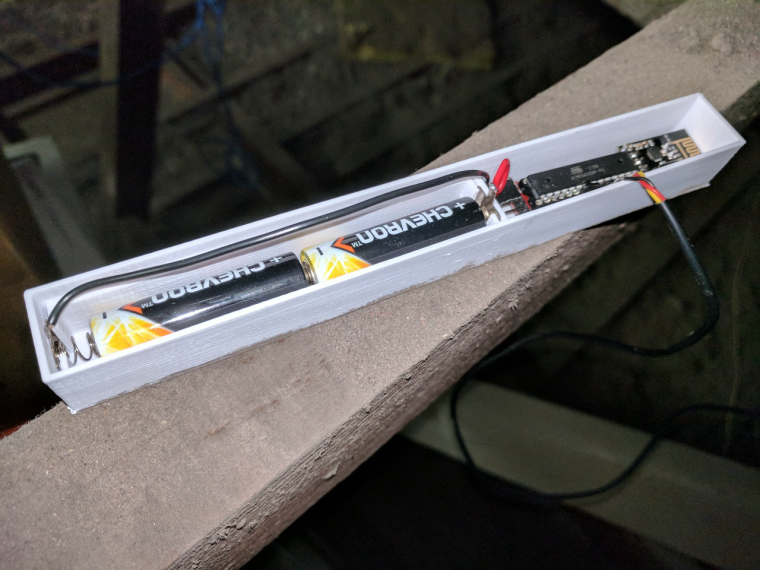
Thoughts, suggestions, etc will be much appreciated!
-
Hi
Did anyone make DHT 22 slim node with MySensors 2.0? I created one Node from modified MySenors 2 example...But I get a feeling that it is freezing sometimes (but then again comes back to life).
-
Hi
Did anyone make DHT 22 slim node with MySensors 2.0? I created one Node from modified MySenors 2 example...But I get a feeling that it is freezing sometimes (but then again comes back to life).
@Oliviakrk - I did a test (which works pretty ok) with a DC/DC step up booster attached to D3 -> Vin. This way I could turn the booster on/off with HIGH/LOW from the sketch. This provided 3.3v to my sensors just fine and has been working for a while now. I dont know what will happen when the voltage drops though.
-
@Oliviakrk - I did a test (which works pretty ok) with a DC/DC step up booster attached to D3 -> Vin. This way I could turn the booster on/off with HIGH/LOW from the sketch. This provided 3.3v to my sensors just fine and has been working for a while now. I dont know what will happen when the voltage drops though.
@sundberg84 Thanks. Will try.
-
Hi,
Thank you for all the hard work put into this project. I have built a few door sensor nodes and have some issues. At first I had pull-ups connected as shown in previous pictures but at a logic 1, when there should have been 3.3V there was only roughly half, 1.7V. I am no expert but I take it there has to be a current leak through the D3 pin for this to happen. I have this on all my nodes. I have tried different code but still the same. When I remove the external pull-up the node works properly but instead the batteries run out in a week or so. Have I made a mistake soldering these and maybe shorted something? I have looked at them closely but can't see anything wrong.Does anyone else have this problem? Any tips?
-
If I disconnect the battery, there is continuity between D3 and VCC with a resistance of around 20 kOhm. So when the door sensor is shut (no resistance), I connect GND through 20 kOhm to VCC. The current should be 0,165 mA. Too high by reading previous posts but still much less than what I get if I measure. Then I get roughly 18 mA! (Far from a Fluke though but has proven reliable before). Am I misunderstanding things?
I have tried different nodes and sketches with pull-ups both enabled and disabled but I doesn't seem to matter. I have tried different radio modules but still the same, unless I use the bigger! antenna-version. Then the current goes up to 24-25 mA.
I have done/am doing something really wrong although they seem to work just fine. Tomorrow I will try more radio modules to see if I can find any difference.

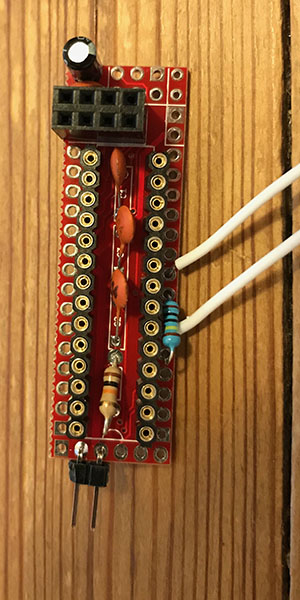
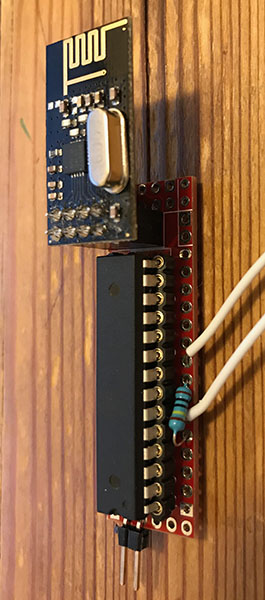
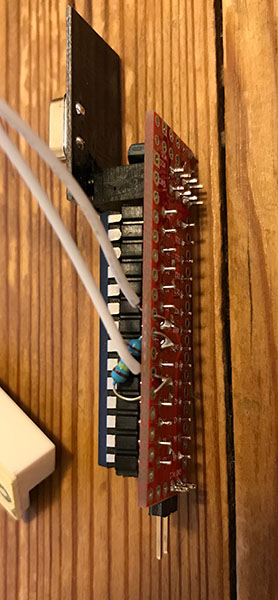
-
If I disconnect the battery, there is continuity between D3 and VCC with a resistance of around 20 kOhm. So when the door sensor is shut (no resistance), I connect GND through 20 kOhm to VCC. The current should be 0,165 mA. Too high by reading previous posts but still much less than what I get if I measure. Then I get roughly 18 mA! (Far from a Fluke though but has proven reliable before). Am I misunderstanding things?
I have tried different nodes and sketches with pull-ups both enabled and disabled but I doesn't seem to matter. I have tried different radio modules but still the same, unless I use the bigger! antenna-version. Then the current goes up to 24-25 mA.
I have done/am doing something really wrong although they seem to work just fine. Tomorrow I will try more radio modules to see if I can find any difference.




@masfak97 It's not clear to me whether you've tried to run it a as pure Arduino, without radio module and without MySensors library in your sketch? (I see that you haven't the serial/FTDI pins soldered - do you use ICSP, pogo-pins or whatever to upload and debug?)
-
I have thought about running it as a pure arduino and to use the debug function, but can't quite get the FTDI to work. I have used this before to upload code to arduino pros. I have a previous node that has all the pins soldered but simply won't be recognized with the USB FTDI. I have also tried switching USB-FTDI but still no luck. Is the FTDI supposed to work if all the pins are there?
I have also bought a USBtinyISP but haven't read up on how to use it.
Currently I install a first boot loader with Nick Gammons sketch running on a UNO connected to a breadboard and the 328. After that has been installed, I install the 8 MHz boot loader by Gert Sanders (thank you of it) and finally upload the code using "Upload using programmer". I currently have no way of reading the serial debug from the node.
I checked the node without the nrf but still power-hungry in the mA.

